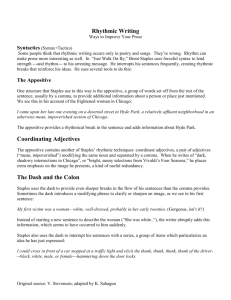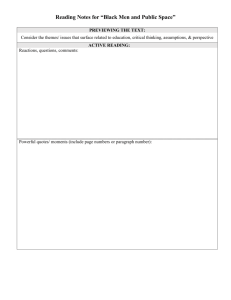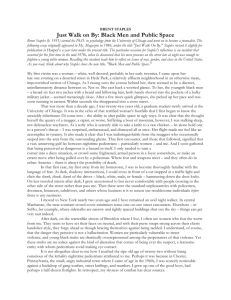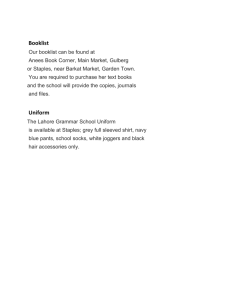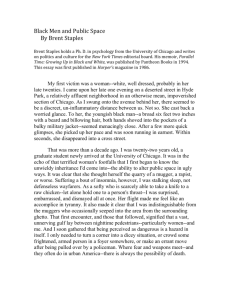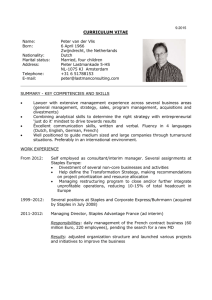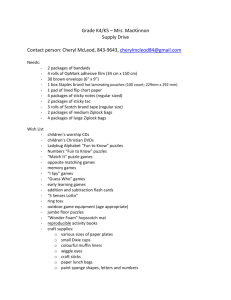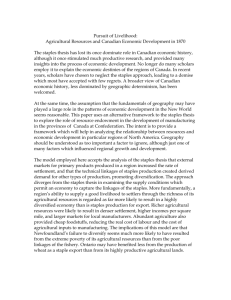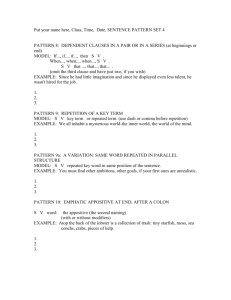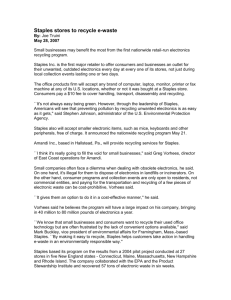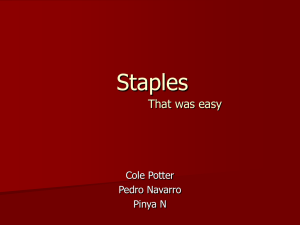Rhythm
advertisement
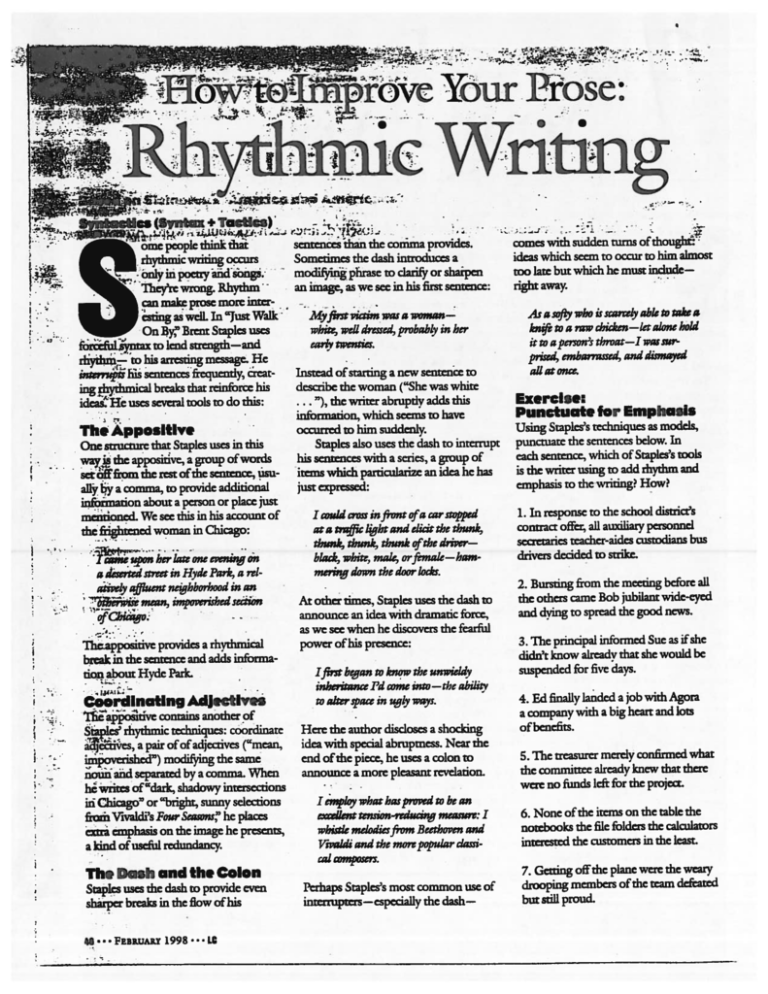
...----.. — -. _.,,_ V. •‘:. — — — V.., V - — itax+Tactics)’ • ... ome people think tha± rhythmic writing occurs ‘-ànly lxi poetry tidsOng5. They’re wrong. Rhythm can make prose more inter esting as well. In wJust Walk On By’ Brent Staples uses fOrcàfiiiSirax to lend strength—and rhythci— to his arresting message. He inte,,wpts his sentences frequently, àeat ing rhythmical breaks that reinfOrce his ideasHc uses several tools to do this: - The Appositive OnestructurcthatStaples uses inthis way,s the appositive, a group ofwords set 6fffrom the rest ofthe sentence, issu ally by a comma, to provide additional infbrmauon about a person or place just mentioned. We see this in his account of the frightened woman in Chicago: l.. . V • . .Lcanzeuponherlat.ecmeeventngon a deserted street in Hyde Park a atwely fij45fl neighborhood in__ menn, ?I’ seion ofchithgo. V - - Thc.appostive provides a rhvthniical break in the sentence and adds infhrma tioz about Hyde Park. J4t). V •H . • - Coordinating Adjectives Thañokive contains another of Staples’ rhythmic techniques: coordinate àc±ves, a pair of of adjectives (“mean, impoverished”) modifying the same noun. arid separated by a comma. When he writes of”dark shadowy intersections iii Chicago” or “bright, sunny selections frath Vivald?s Four Seasons’ he places extra emphasis on the image he presents, a kind of useful rcdundancy The Dash and the Colon Staples uses the dash to provide even sharper breaks in the flow ofhis U•”FEBKUARY1998•••LC .‘ -,. ., . •V . . ‘y.::..• . sentences than the conma provides. Sometimes the dash introduces a modifyip phrase to darify or shaipen an image, as we see in his first sencc: comes with sudden turns of thought ideas which seem to occur to him almost too late but which he must indude— right away. Myfirst victim was a woman— white, well dressed, probably in her early twenties. As asofry who isscareely able to take a knift to a muw thicken—let alone hold it to apeison’s throat—I was sur prua4 embaimued, and dismayed all at once. — Instead of starting a new sentence to describe the woman (“She was white “), the writer abruptly adds this information, which seems to have occurred to him suddenly. Staples also uses the dash to interrupt his sentences with a series, a group of items which particularize an idea he has just expressed: I amid avss infhmt ofa azr stopped ate tmfflc ljqbt and elicit the thunk, thunk, thunk, thunk ofthe driver— black, white, male, orftmale—ham mersng down the door locks. Arothertimes, Staplesusesthedashto announce an idea with dramatic force, as we see when he discovers the fearful power ofhis presence: Iflrst began to know the unwieldy inheritance Pd come into—the ability to alaerspace in ugly ways. Here the author disdoses a shocking idea with special abruptness. Near the end ofthe piece, he uses a colon to announce a more pleasant revelation. • Exercise: Punctuate for Emphasis Using Staples’s techniques as models, punctuate the sentences below. In each sentence, which of Staples’s tools is the writer using to add rhythm and emphasis to the writing? How 1. Inresponsetotheschooldisrrict’s contract offer, all auxiliary personnel secretaries teacher-aides custodians bus drivers decided to strike. 2. Bursting from the meeting before all the others came Bob jubilant wide-eyed and dying to spread the good news. 3. The principal informed Sue as ifshe didn’t know already that she would be suspended for five days. 4. Ed finally landed a job with Agora a company with a big heart and lots of benefits. 5. The treasurer merely confirmed what the committee already knew that there were no funds left fOr the project. lemploy what haspnwed to bean excellent tension-reducing measure: I whistle ne1odiesfi’vm Beethoven and Vivaldi and the morepopular darn cat composers 6. None of the items on the table the notebooks the file fOlders the calculators interested the customers in the least. Perhaps Staples’s most common use of interrupters—especially the dash— drooping members ofthe team defrated but still proud. 7. Getting off the plane were the weary
